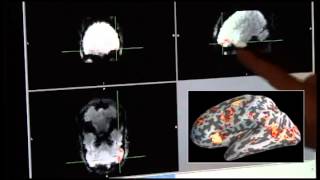rtfMRI Neurofeedback – Using tobacco Cessation
 Actual time fMRI (rtfMRI) neurofeedback is a instrument that has been developed to support men and women discover to management their personal mind activity patterns to establish whether or not enhanced mind manage leads to improved scientific results in problems this sort of as addiction, obesity, despair, ADHD, OCD, and traumatic mind injuries. The adhering to video clip is an rtfMRI neurofeedback demonstration of an experiment that was developed to educate nicotine-dependent smokers to control an location of the brain included in resisting the urge to smoke. Every participant is informed that they will be playing the ‘Control Your Brain’ sport. The objective of the match is for each and every participant to determine pondering approaches that are powerful at changing their mind activity, which they will be observing although in the MRI device.
Actual time fMRI (rtfMRI) neurofeedback is a instrument that has been developed to support men and women discover to management their personal mind activity patterns to establish whether or not enhanced mind manage leads to improved scientific results in problems this sort of as addiction, obesity, despair, ADHD, OCD, and traumatic mind injuries. The adhering to video clip is an rtfMRI neurofeedback demonstration of an experiment that was developed to educate nicotine-dependent smokers to control an location of the brain included in resisting the urge to smoke. Every participant is informed that they will be playing the ‘Control Your Brain’ sport. The objective of the match is for each and every participant to determine pondering approaches that are powerful at changing their mind activity, which they will be observing although in the MRI device.
Video clip courtesy Luke Stoeckel, Ph.D., Director, Cognitive & Medical Neuroscience of Obesity & Diabetic issues Plan, Nationwide Institute of Diabetic issues & Digestive & Kidney Illnesses Study Consultant, Office of Psychiatry, Massachusetts Standard Healthcare facility
Lecturer on Psychology, Division of Psychiatry, Harvard Medical Faculty
This analysis was carried out by investigators from the Evins (Office of Psychiatry, Center for Habit Drugs, Massachusetts Common Healthcare facility) and Gabrieli (Division of Brain and Cognitive Sciences, McGovern Institute for Mind Investigation, Massachusetts Institute of Technologies) labs. This investigation was carried out at the Athinoula A. Martinos Imaging Centre at the McGovern Institute for Mind Research at the Massachusetts Institute of Technologies. Help was provided by the National Institutes of Overall health: K23DA032612, K24DA030443, R21DA030523 the Norman E. Zinberg Fellowship in Habit Psychiatry at Harvard Medical School the Charles A. King Have confidence in the McGovern Institute Neurotechnology Plan and philanthropic donations to the Poitras Center for Affective Issues Study and the Massachusetts Common Clinic Department of Psychiatry.
